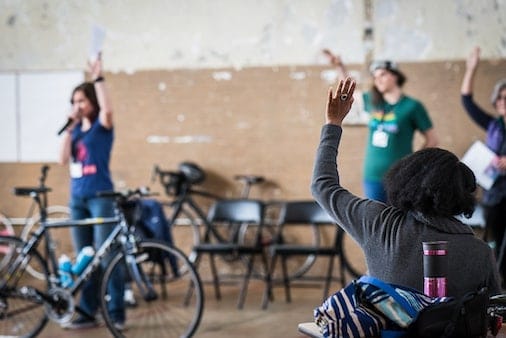
Bike Pittsburgh’s Women & Non-Binary Program
Did you know only 32% of Pittsburgh bike commuters identify as women? In truly bike-friendly cities, that number is much closer to 50%.
BikePGH’s Women & Non-Binary program was created to break down barriers to bicycling and increase the representation of people who have historically marginalized gender identities. The program is inclusive of trans, non-binary, and intersex people, cis women, genderqueer, agender and gender variant folks, as well as those whose gender identity falls outside of the dominant conceptions of gender.
WMNBikePGH aims to connect and empower those who might feel excluded from the male dominant cycling culture with free educational workshops, group rides, and social events in a safe and supportive environment. Together, we can build a more inclusive and equitable community for people who want to ride bikes.
Want to stay up-to-date on what’s happening? Join our WMNBikePGH Facebook Group and subscribe to our quarterly Women & Non-Binary Program eNewsletter.
This year’s programming is made possible with generous support from
Aerie Real Foundation & Dollar Bank.
RIDES & MEETUPS
Mark your calendars!
Inclusive Group Rides
Annual GAP Camping Trip
and more planned for 2026!
Click “Rides & Meetups” above to view dates and details on rides, classes, and more.
RESOURCES
Want to learn how to maintain your bike? Want to learn how to be a more confident rider? Check out these videos from previous guest speakers and leaders in the cycling community. All Women and Non-Binary folks of course!
WMNBikePGH Program FAQs
- Why does a bicycling program for trans and cis women, intersex people, non-binary, genderqueer, agender and gender variant folks need to exist?
- It is important to create space for groups of people who are not able to access mainstream and dominant cultural experiences due to a marginalized identity. Women and non-binary people are historically underrepresented in the bicycle industry, racing, advocacy and more.
- Biking was a central part of the women’s liberation movement, and today continues to be an inspiring force in providing agency, access, exercise, right to self-determination of space and time.
- How can I respect people and their gender identities?
- Ask for people’s pronouns and never assume pronouns or identity based on how you perceive them
- Avoid using language that assumes gender identities, like “guys” and “ladies”
- Respect people’s names, pronouns, expressed identities and experiences
- Do not ask intrusive questions or revolve conversations around peoples’ identities
- Speak from an “I” standpoint – speak for yourself and share your own story
- Practice active listening to the person you are talking to, rather than focusing on your response, or forcibly relating back and inserting your own experience
- Challenge gender discrimination – advocacy is an important part of gender equity, which is intrinsically linked to the liberation of all oppressed people
- Check out NPR’s helpful guide to gender identity terms
- Are cis-men allowed at the WMNBikePGH events? How can cis-men support this program?
- Many aspects of mainstream bike culture can be unwelcoming for those who do not benefit from cis-male privilege. WMNBikePGH events are purposefully free from cis-men in order to create safe, inviting spaces with less fear of gender oppression and to amplify marginalized voices in the cycling community. WMNBikePGH strives to make safer spaces by respecting people and their preferred names and pronouns, not making assumptions about gender, and cultivating an atmosphere of respect and inclusion.
- Rather than focusing on feelings of exclusion, we hope cis-men work to develop compassion, understanding and at the very least respect for those who are simply seeking a safe space to bike and meet new people.
- Cis-men can support this program by:
- Continuing to learn about gender expression, inequity, and gender marginalization
- Being mindful of their use of language, physical gestures, and expression
- Being aware of the space they take up, asking questions and never assuming people’s identities
- How have women and non-binary people been historically underrepresented in bicycling?
- Women and non-binary people are underrepresented in bicycle industry leadership positions, including the boards of national industry and advocacy organizations. They also remain underrepresented within the majority of transport planning and engineering teams who design the cycling infrastructure for our streets.
- Women and non-binary people are often subject to double standards around bike racing and competition or don’t have a place created for them at all.
- How have safe spaces for women and non-binary people been successful in other capacities?
- Yes! Creating safer spaces for people with marginalized gender and/or sexuality is common across the globe
- Here are some of our sibling programs in the US:
- Are there other local women & non-binary specific cycling groups?
- Yes! Here are some of our sibling programs in Pittsburgh:



